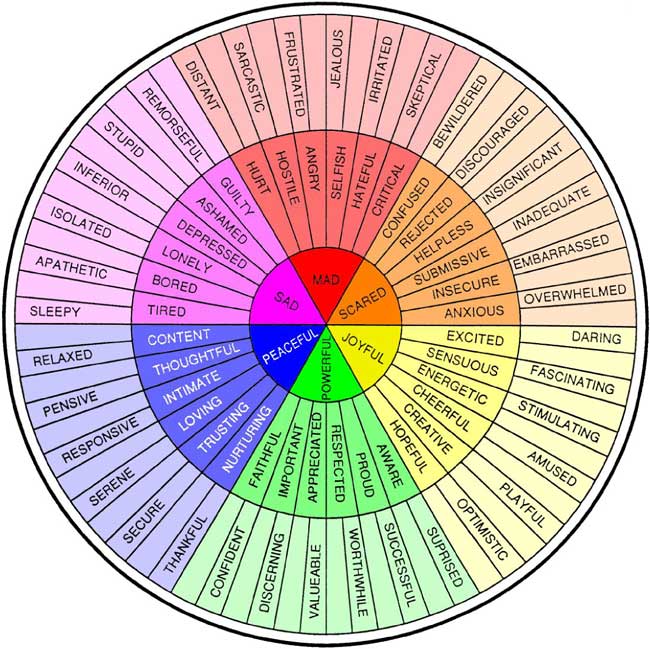The Feelings Wheel
For with much wisdom comes much sorrow; the more knowledge, the more grief. Ecclesiastes 1:18 NIV
Sorrow – Yesterday we asked, “How can wisdom, a good thing, generate sorrow, a bad thing?” Maybe we should have questioned the translation before we questioned the ethics. In Hebrew, the word translated “sorrow” (NIV) is kaʿas. Other English translations use the terms grief, hurt, or vexation. Only Young’s Literal Translation uses the term “sadness.” The TWOT suggests that some of these choices aren’t quite correct. “The root meaning of kāʿas is to vex, agitate, stir up, or provoke the heart to a heated condition which in turn leads to specific actions.”[1] It’s worth noting that kaʿas applies to God and men. Sin and disobedience vex or frustrate God, calling forth wrath and punishment. “ . . . man vexes God; man, created and called to please and glorify God, when he falls into sin, gives him [God] a deep agitation of heart. Man also is a source of vexation to his fellow-men. . . A foolish son produces vexation or grief for his father (Prov 17:25). Adversaries, physical and spiritual, are a source of vexation and tears for the righteous (Ps 6:7 [H 8]).”[2] In other words, wisdom is accompanied by frustration, worry, and annoyance (vexation). It’s not that wisdom produces regret and depression. Rather, wisdom carries along with it a sense of frustration, an awareness of the great disparity of life, and this disparity is bedfellows with worry. Think of it this way: It’s possible to know too much. In fact, the more you know, the greater you are aware of not only your own inadequacies and inabilities, the more you are aware of the chasm between the way the world ought to be and the way the world is. You observe the widening gap between God’s holiness and human religion. You feel the disconnection between intention and action. Romans 7 becomes personal. Life isn’t what you expected, and it’s getting worse.
This certainly fits Ecclesiastes. Life is ultimately pointless. Good is swallowed up in the final card played—death. Seeking wisdom is honorable, noble, pure. But the unforeseen consequences can be paralyzing, demoralizing, at the least, uncomfortable, because knowing more isn’t limited to the “good” stuff. Knowing more encompasses the bad as well. As my horizons expand, so does my apprehension of the darker depths. Yin-yang.
The “Feelings Wheel” shows me that the basic six emotions come in pairs: Powerful vs. Mad, Peaceful vs. Scared, Joyful vs. Sad.

Just as knowing is an extension of Joyful, so it is also the counterpoint of Sad, carrying with it lonely, guilty, depressed, bored, remorseful, apathetic, and isolated. Ying-yang. You can’t have one without the other. Qohelet observes the complementarian combination. Be warned.
Topical Index: kaʿas, vexation, sorrow, sad, wisdom, Ecclesiastes 1:18
[1] (1999). 1016 כָעַס. R. L. Harris, G. L. Archer Jr., & B. K. Waltke (Eds.), Theological Wordbook of the Old Testament (electronic ed., p. 451). Chicago: Moody Press.
[2] Ibid.



